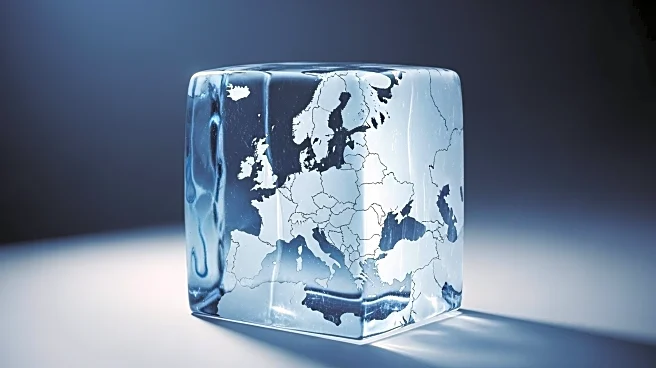What's Happening?
European Union leaders are contemplating a plan to utilize frozen Russian assets to aid Ukraine, as the conflict with Russia continues. The proposal, termed a 'reparations loan,' involves redirecting approximately
€140 billion of Russian state assets, currently held by Euroclear, a financial institution in Belgium. This initiative has been under discussion for months due to its legal complexities and concerns about global financial stability. Belgium has expressed reservations about the plan, fearing potential legal repercussions if Russia challenges the use of its assets. Russia has strongly opposed the idea, with its Foreign Ministry warning of severe consequences if the EU proceeds. The EU has already been using interest from these frozen assets to support Ukraine's defense, amounting to €3 billion annually. The proposed plan would provide immediate liquidity to Ukraine, with the understanding that Kyiv would repay the loan through reparations from Moscow once the conflict ends.
Why It's Important?
The proposal to use frozen Russian assets is significant as it represents a novel approach to funding Ukraine's defense and reconstruction efforts, which are estimated to cost over $486 billion. With dwindling support from the United States, the EU is seeking alternative means to sustain Ukraine's resistance against Russian aggression. However, the plan poses legal challenges, as international law prohibits outright confiscation of sovereign assets. The EU's strategy involves 'borrowing' the assets and replacing them with an IOU backed by member states, which could set a precedent affecting global financial stability. The move could deter other countries from trusting Western financial institutions with their assets, potentially impacting the EU's reputation as a reliable depository of foreign wealth.
What's Next?
If EU leaders approve the reparations loan at their summit, the European Commission will draft a formal legal proposal. Belgium remains cautious, seeking assurances that the risk will be shared among all member states. The plan's success hinges on Ukraine winning the war and Russia agreeing to pay damages, which is uncertain. Should Russia refuse, the EU might forgive Ukraine's debt, but European taxpayers would bear the financial burden. The decision could influence future international monetary policies and the EU's role in global financial systems.
Beyond the Headlines
The proposal raises ethical and legal questions about the use of sovereign assets in conflict situations. It challenges the established norms of international finance and could lead to long-term shifts in how countries manage and protect their foreign investments. The EU's approach may influence future geopolitical strategies and the balance of power in international relations.









